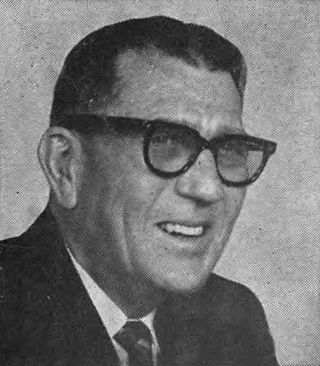Top Qs
Timeline
Chat
Perspective
Earle Cabell
American politician (1906–1975) From Wikipedia, the free encyclopedia
Remove ads
Earle Cabell (October 27, 1906 – September 24, 1975) was an American politician who served as the 48th mayor of Dallas from 1961 to 1964. Cabell was mayor at the time of the assassination of United States President John F. Kennedy and was later a member of the U.S. House of Representatives.
Remove ads
Early life
Cabell was born in Dallas. He graduated from North Dallas High School in 1925. He attended Texas A&M University for one term, where he met Jack Crichton and H.R. "Bum" Bright, and thereafter Southern Methodist University for one term.[1]
He and his brothers founded Cabell's Inc., a chain of dairies and convenience stores. He later became involved with banking and other investments. In April 1961, he was elected mayor to succeed Robert L. Thornton.[citation needed]
Cabell was a member of the Dallas Crusade for Freedom.[2]
Family
Cabell was the youngest of four sons of the then former Dallas Mayor Ben E. Cabell and also the grandson of the former Dallas Mayor and Confederate General William L. Cabell.[3] He was the brother of Charles Cabell, who was deputy director of the Central Intelligence Agency from 1953 to 1962.[4]
Remove ads
Mayor of Dallas
Summarize
Perspective
In October 1961 President Kennedy flew to Dallas but when he arrived at the airport he was greeted only by the Dallas chief of police. Cabell claimed he was too busy to meet Kennedy and the White House was reportedly "steaming over the official brush-off".[5]
Cabell and his wife met United States President John F. Kennedy and Mrs. Kennedy at Love Field on the morning of November 22, 1963.[6] Cabell's wife reported that while riding in Kennedy's motorcade through Dealey Plaza, she observed "a rather long looking thing" sticking out of a window of the Texas School Book Depository immediately after the first shot.[7] After receiving word from the Federal Bureau of Investigation that he was the subject of a death threat, Cabell was guarded by police when he traveled to Washington, D.C. to attend Kennedy's funeral and also upon his return to Dallas.[8]
One version of John F. Kennedy assassination conspiracy theories, the "Renegade CIA Clique" theory, implicates Cabell and other alleged conspirators, including CIA officials James Jesus Angleton, William King Harvey, and Cabell's brother Charles Cabell, who had been fired by Kennedy following the Bay of Pigs Invasion.[9] This theory claims that Earle Cabell re-routed Kennedy's motorcade as a favor to his brother.[9]
In 2017, documents declassified under the JFK Records Act revealed that Cabell had been a CIA asset since 1956.[10]
Remove ads
Congress
On February 3, 1964, Cabell resigned as mayor of Dallas in order to run for Congress. He unseated the ten-year Republican incumbent Bruce Alger. Cabell served four terms in the House before he was defeated by Republican Alan Steelman in the 1972 election. Cabell voted in favor of the Voting Rights Act of 1965 and the Civil Rights Act of 1968.[11][12]
Later life
Following his defeat, he retired in Dallas, where he lived until his death in 1975 from emphysema. He was buried at Restland Cemetery in Dallas.[13]
Legacy
The Earle Cabell Federal Building and Courthouse on Commerce Street in Dallas is named in his honor.[14]
References
External links
Wikiwand - on
Seamless Wikipedia browsing. On steroids.
Remove ads

